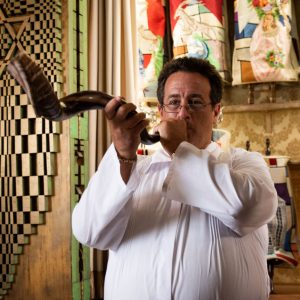Torah Commentary with Rabbi Laurence Rosenthal
Parshat Tetzaveh - Don't Burn the Candle at Both Ends
Exodus 27:20 - 30:10; Ezekiel 43:10 - 27
By Rabbi Laurence Rosenthal

כָּתִית לַמָּאוֹר לְהַעֲלֹת נֵר תָּמִיד:
You shall further instruct the Israelites to bring you clear oil of beaten olives for lighting, for kindling lamps regularly (Exodus 27:20).
This commandment which begins this week's sidra is interestingly positioned. Coming directly after the collection of the material needs for the Mishkan, mobile sanctuary, and followed by the textiles needed gathered for the priestly garments, the manufacturing of oil and lighting the menorah seems a bit out of place. Interestingly, the commandment at hand doesn't deal with the construction of the menorah but instead focuses on the oil used for kindling the lights, the consumables for this important spiritual undertaking. Whereas the mishkan and priestly clothing will last for a while, especially if cared for, the oil is meant to be burn away and therefore, the instruction for pressing and collecting the oil is an ongoing endeavor, continually being managed and monitored to ensure oil for the spiritual work to be done. This reminds me of the Hanukah story which relates a situation where oil isn't available. Amid a discussion about collecting metals and fabrics and crafting them into vessels and clothing, what message are we to derive from a description about pressing oil? Rabbi Samson Raphael Hirsch helps to illuminate the meaning (pun intended). He writes
Although the oil and the curtains are not among the constituent material of the Sanctuary, but, rather, belong to the category of materials needed for the Avodah (service) in the Sanctuary, nevertheless, together they give expression to the whole aim of a person's refinement, for the sake of which the mikdash (Holy Temple) is to be erected: Enlightenment of the spirit and perfection of deeds so that they are pleasing before God.
For me, the creation of the Mishkan and holy garments are metaphoric for the spiritual spaces and garments we must create as part of our spiritual journey. Creating the space and the garments of a spiritual, moral and ethical life is something in which many of us participate. However, are we being mindful about the fuel that is needed to ignite our passions and allow us to provide for others and ourselves? We have terms that we use in English which speak to these diminishing reserves like what our Torah begins this week – burning the candle at both ends; running too hot; etc. A life lived spiritually, morally, and ethically is lived as a marathon, not a sprint. Our Parsha's opening with just two pasukim (sentences) focused on the oil to be used for the Menorah is a reminder about the need for constant creation and regeneration of the fuel that lights our fire. Do we know where that fuel comes from? Are we allocating time to cultivate, nurture and tend to our own 'oil' production? Our Jewish practice offers rituals, seasons, gatherings, and actions that are regenerative. Are we celebrating Shabbat and allowing for spiritual and physical rest? Are we utilizing prayer, holidays, and community to uplift and embolden us? Are we carving out time in our schedule for spiritual study of our sacred scriptures to help inspire and guide our lives? The Torah offers us a gentle reminder that although oil grows on trees, if we aren't taking stock of our reserves, we might end up burning out.






























